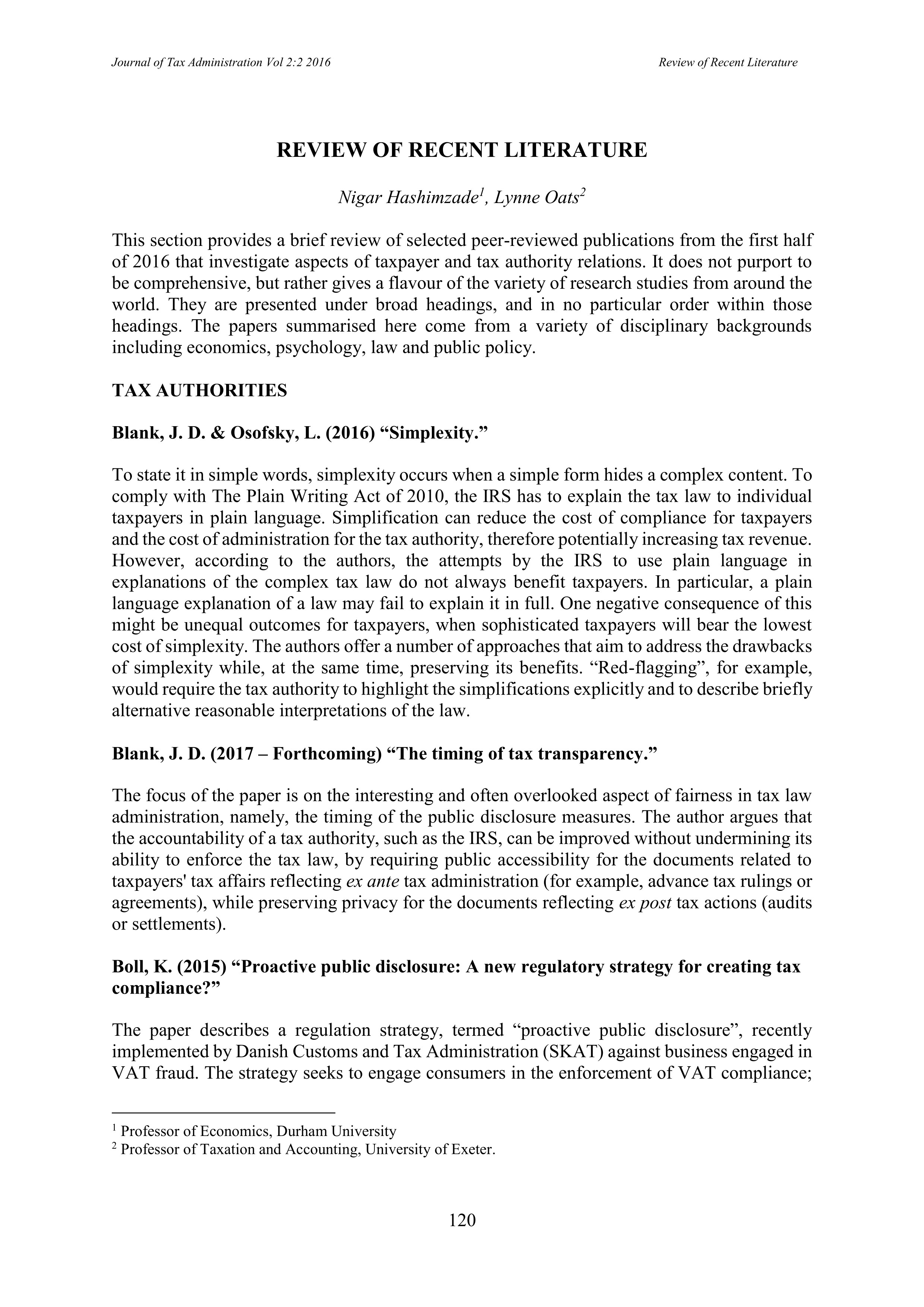Review of Recent Literature
Keywords:
Tax Authorities, Tax Compliance, Tax Avoidance, Tax Evasion and Corruption, Tax Practitioners, Tax Litigation, International Co-operationAbstract
This section provides a brief review of selected peer-reviewed publications from the first half of 2016 that investigate aspects of taxpayer and tax authority relations. It does not purport to be comprehensive, but rather gives a flavour of the variety of research studies from around the world. They are presented under broad headings, and in no particular order within those headings. The papers summarised here come from a variety of disciplinary backgrounds including economics, psychology, law and public policy.
References
Alm, J., Martinez-Vazquez, J., & McClellan, C., (2016). “Corruption and firm tax evasion.” Journal of Economic Behavior and Organization, 124, 146-163.
Blank, J.D., & Osofsky, L. (2016). “Simplexity”. Emory Law Journal, 66. (forthcoming)
Blank, J.D. (2017). “The timing of tax transparency”. Southern California Law Review, 90 (forthcoming)
Bornman, M., & Stack, E. M. (Lilla) (2015). “Specific rewards for tax compliance: Responses from small business owners in Ekurhuleni, South Africa.” eJournal of Tax Research, 13(3), 799-818.
Bruhn, M., & Loeprick, J. (2016). “Small Business Tax Policy and Informality: Evidence from Georgia.” International Tax and Public Finance, 23(5) 834-853. doi: 10.1007/s10797-015-9385-9
Casal, S., & Mittone, L. (2016). “Social esteem versus social stigma: The role of anonymity in an income reporting game.” Journal of Economic Behavior and Organization, 124, 55-66.
Choo, C.Y., Fonseca, M.A., & Myles, G.D. (2016). “Do students behave like real taxpayers in the lab? Evidence from a real effort tax compliance experiment”. Journal of Economic Behavior and Organization, 124, 102-114.
Hakelberg, L. (2016). “Coercion in international tax cooperation: Identifying the prerequisites for sanction threats by a great power”. Review of International Political Economy. doi: 10.1080/09692290.2015.1127269
Finley, A.R., and Stekelberg, R. (2016). “The economic consequences of tax service provider sanctions: Evidence from KPMG’s deferred prosecution agreement”. Journal of the American Taxation Association, 38(1), 57-78.
Freedman, J. (2016). “UK institutions for tax governance: Reviewing tax settlements”. British Tax Review, Issue 1, 2016, 7-12.
Frecknall-Hughes, J., Moizer, P., Doyle, E., and Summers, B. (2016). “An examination of ethical influences on the work of tax practitioners”. Journal of Business Ethics.
Hashimzade, N., Myles, G., & Rablen, M.D. (2016). “Predictive analytics and the targeting of audits.” Journal of Economic Behavior and Organisation, 124, 130-145.
Lederman L. (2016). “The IRS, politics, and income inequality”. Tax Analysists: Tax Notes, March 14, 1329-1333.
Litina, A., & Palivos, T. (2016). “Corruption, tax evasion and social values.” Journal of Economic Behavior and Organisation, 124, 164-177.
Manca, M., (2016). “The new Italian cooperative compliance regime”. European Taxation, April 2016, 152-160.
Onu, D., and Oats, L. (2016). ““Paying tax is part of life”: Social norms and social influence in tax communications”. Journal of Economic Behaviour & Organization, 124, 29-42.
Randlane, K. (2016). Tax Compliance as a System: Mapping the Field. International Journal of Public Administration 39(7), 515-525. doi:10.1080/01900692.2015.1028636
Satterthwaite, E.A. (2016). “Can audits encourage tax evasion? An experimental assessment”. Florida Tax Review (forthcoming)
Van der Pas, J. (2016). “Improving the Chinese Anti-Avoidance Rule: A Comparative and Functional Approach.” World Tax Journal, 80-100.

Downloads
Published
How to Cite
Issue
Section
License
Copyright (c) 2016 Nigar Hashimzade, Lynne Oats

This work is licensed under a Creative Commons Attribution 4.0 International License.
Our open access status means that authors retain the copyright of their work. However, all papers published in JOTA are done so under a Creative Commons Attribution 4.0 International license (CC BY). This means that others can share and/or adapt your work without your permission as long as they follow certain rules, including attributing your work correctly.
You can learn more about this on our Open Access, Licensing, and Copyright Policies page.



